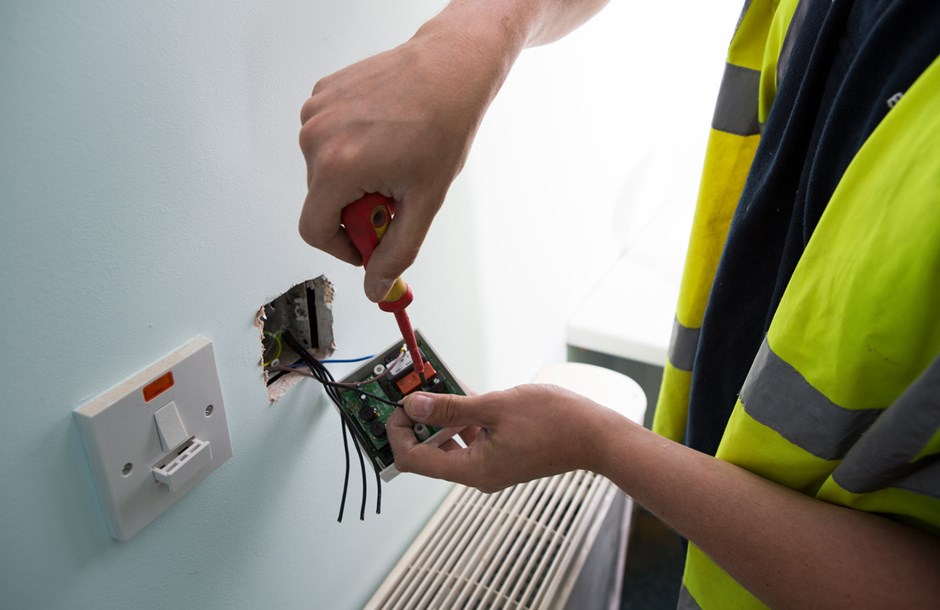How to retrain as an electrician
Can you become an electrician at 40, or older?
Yes, of course you can. Find out what the options are for retraining and having a career in the electrical industry at any stage of your working life.

Why retrain as an electrician?
Changing career might seem like a daunting thing to do, but there’s a lot to be said for retraining. There’s no point doing a job that you don’t enjoy, or doesn’t tick all those boxes about what makes a fulfilling career. It is possible to become an electrician in later life – you don’t have to be young to do an apprenticeship. If you like fixing things, have an interest in electrics and a practical approach to solving problems, working as an electrician could be an ideal job for you. Electricians are always in demand, and there are great opportunities to progress in the electrical industry.
Things to consider
Cost considerations
To become a qualified electrician you will need to undertake a college course or an apprenticeship. The latter is preferable especially if you are older, because you will be getting paid a salary during your apprenticeship. Apprentices are paid the National Minimum or National Living Wage, and those over the age of 23 are paid the highest rate. However, this could still mean a significant drop in income. Studying for an NVQ level qualification on a college course will involve paying a course fee.
Time and commitment
Training as an electrician does not happen overnight. To be fully qualified you need to have successfully achieved the Level 2 and Level 3 electrician apprenticeship qualifications. If you have 4-5 GCSEs at grade 9-4 (A*-C), you might be accepted onto the Level 3 apprenticeship directly. But the Level 3 apprenticeship programme takes 3-4 years to complete, and if you are doing both Level 2 and 3, you could be training as an electrician for 4-5 years before qualifying. Older people may have more financial and personal responsibilities, so you need to be sure that you can fully commit to such a long period of retraining.
Domestic installer or other type of electrician?
Domestic or residential installer
Most electricians handle domestic electrical work – fixing electrical faults in private housing, and installing or replacing wiring and electrical systems. Domestic electricians will often work alongside other tradespeople, especially on construction sites. You are fully qualified to perform this kind of work after completing the Level 3 City and Guilds domestic electrician apprenticeship and passing the AM2 assessment, which tests your ability to install, commission and test electrical systems.
Electrical tester or engineer
Electrical testers survey, test and inspect electrical installations in homes and businesses. They identify faults and complete test reports to confirm which equipment is working safely and efficiently, and which are unsafe to use.
Electrical engineers design, develop and maintain electrical systems for buildings, transport systems and power distribution networks. Electrical engineers work in and across many industries. They need a good understanding of engineering science, and strong maths and computer skills.
Retraining options
NVQ courses
College courses offer the chance to retrain as an electrician by taking NVQ Level 1, 2 or 3 Diplomas. Depending on their prior knowledge of the subject and previous qualifications, students can choose the introductory Level 1 Diploma, the intermediate course in Electrical Installation (Level 2), or the advanced Installation and Maintenance (Level 3). Courses are offered by training providers in specific locations and may take place over a much shorter period of time than an apprenticeship.
Online courses
Some electrician courses are offered 100% online – however, be very wary of these, as they may often have no professional accreditation that is recognised by the electrical industry. If the course is not endorsed by the City & Guilds or EAL, the awarding organisation for the electrotechnical industry, then it is best to give it a wide berth.
Apprenticeship
Apprenticeships are an established and respected route into the electrical industry. There are three levels to the electrician apprentice pathway:
- Level 1 Diploma in Electrical Installation
- Level 2 Electrical Installation
- Level 3 Domestic Electrician
- Level 3 Installation and Maintenance Electrician
Is there an age limit on retraining as an electrician?
No, as long as you are of working age you can train to become an electrician. There may be more challenges involved for people in their 40s, 50s or 60s, but the work is less physical than some in the construction industry.
How long does it take to retrain as an electrician?
A Level 3 Domestic Electrician apprenticeship usually takes 3-4 years to complete. If you take a college course you may be able to reduce this training time, but you will still need plenty of work experience before having the skills and knowledge to become a fully qualified electrician.
Check out which electrician roles are available
There are several ways you can find employers that offer electrical apprenticeships. You can use websites like Talentview, apply directly to employers, contact local colleges or ask friends or family members if they know of apprenticeships available at companies.
Find out more about a career as an electrician
Go Construct has a wide range of resources and information about training and working as an electrician.
